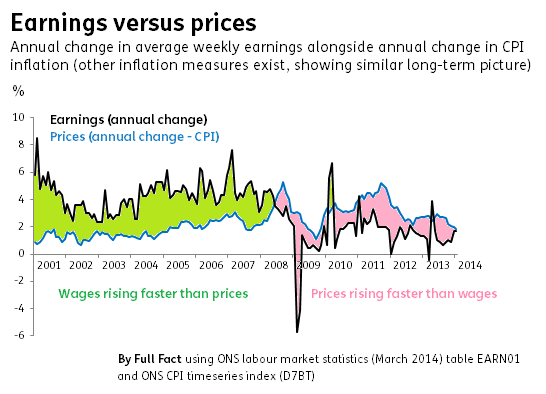How inflation could save you £500 a year
Labour often talks about the trend since the election - albeit using a slightly different measure of inflation. Shadow Work and Pensions Secretary Rachel Reeves this morning repeated the party's line:
"It's clear that David Cameron and Iain Duncan Smith have nothing to say about the cost-of-living crisis which has meant working people have seen their pay fall by £1,600 a year since 2010. [...] Long-term youth unemployment has doubled under David Cameron."
As we've said before, Labour's figures on the cost of living are out of date: taking the latest statistics on average earnings and using their preferred measure of inflation (the Retail Prices Index) there's been a £1,468 fall in gross annual earnings since the election.
Join 72,953 people who trust us to check the facts
Sign up to get weekly updates on politics, immigration, health and more.
Subscribe to weekly email newsletters from Full Fact for updates on politics, immigration, health and more. Our fact checks are free to read but not to produce, so you will also get occasional emails about fundraising and other ways you can help. You can unsubscribe at any time. For more information about how we use your data see our Privacy Policy.
The RPI is no longer seen as a robust measure - based on two other commonly-used measures of inflation it's a fall of between £907-£950.
Labour's analysis differs to the government's own analysis (using a different set of figures) which finds wages for the majority rising faster than prices - we've written about the difference between the two analyses today.
Long-term youth unemployment for 18-24 year olds on Jobseeker's Allowance for over a year has doubled since 2010, increasing by 98%. But there's no one definition of long-term youth unemployment and other definitions show a less steep change. We wrote about this last month.
